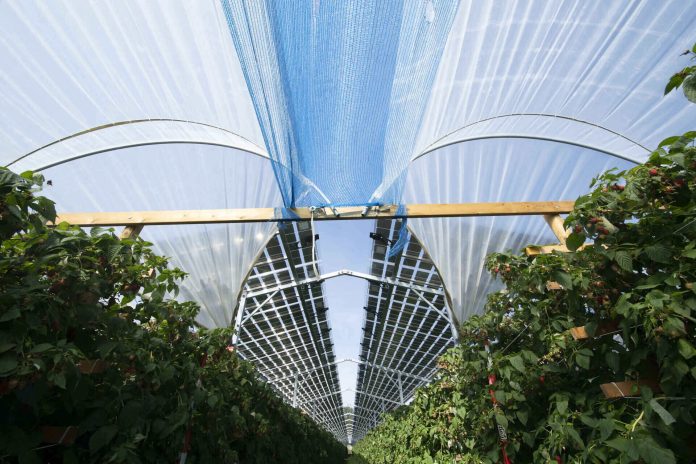Climate change and destructive weather events have become a part of our daily lives. There is no sector that is not threatened by them, but it seems that agriculture is among the hardest hit.
The stormy weather conditions that Croatian agriculture has faced in recent weeks have caused immeasurable damage, primarily to permanent crops. Wind gusts and hailstorms have been destroying trees and fruits, resulting in losses in overall agricultural production. In Europe, agrisolars have emerged as an innovative and environmentally friendly solution to this problem. The possibility of installing them has recently been regulated in Croatia as well.
Agrisolars provide an innovative approach to food production and clean energy generation in the same location, with strategically placed solar panels on agricultural land, above agricultural crops. Simultaneous production of food and energy from renewable sources enables dual land use, which, in terms of efficiency and multifunctionality, surpasses traditional production methods.
However, the importance of agrisolars is not limited to dual production; their contribution extends much further.
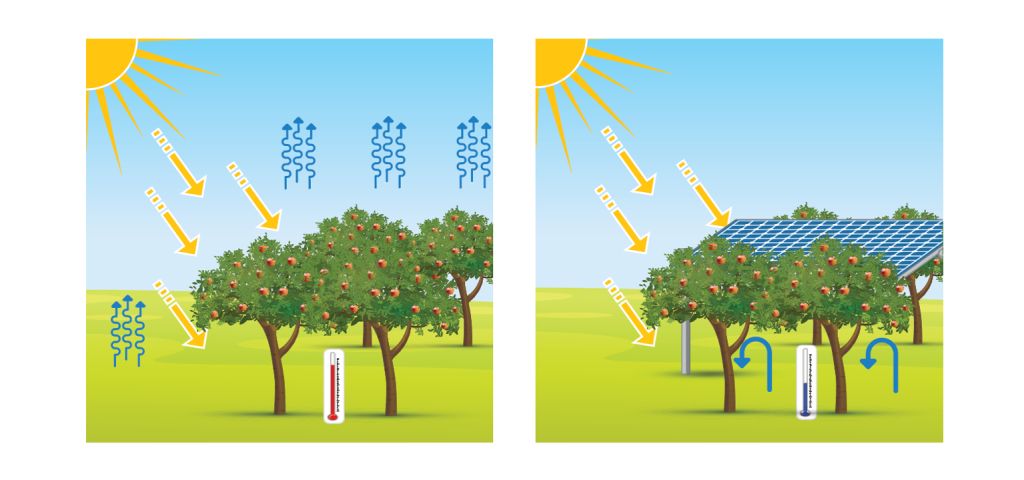
Agrisolars are setting new standards in agriculture when it comes to increasing resilience to climate change. Furthermore, their key role lies in protecting agricultural crops from adverse weather conditions such as intense sunlight, strong winds, heavy rains, and hail.
Agrisolar systems, therefore, act as agro-technical measures and provide physical protection for agricultural crops. Recognizing agrisolars as a powerful tool in combating climate change and as a crucial element in protecting agricultural production could lead to revolutionary changes in how we view agriculture.
Considering the current climate events in continental Croatia, we provide an overview of the possibilities for protection from these conditions through agrisolar power plants.
Agrisolars as Protection Against Strong Winds
With climate change, we are witnessing an increase in the frequency and intensity of storms and strong winds. They can be destructive to permanent crops, causing serious damage or even complete loss. However, the robust structures of solar panels used in agrisolar systems can serve as excellent protection for agricultural crops.
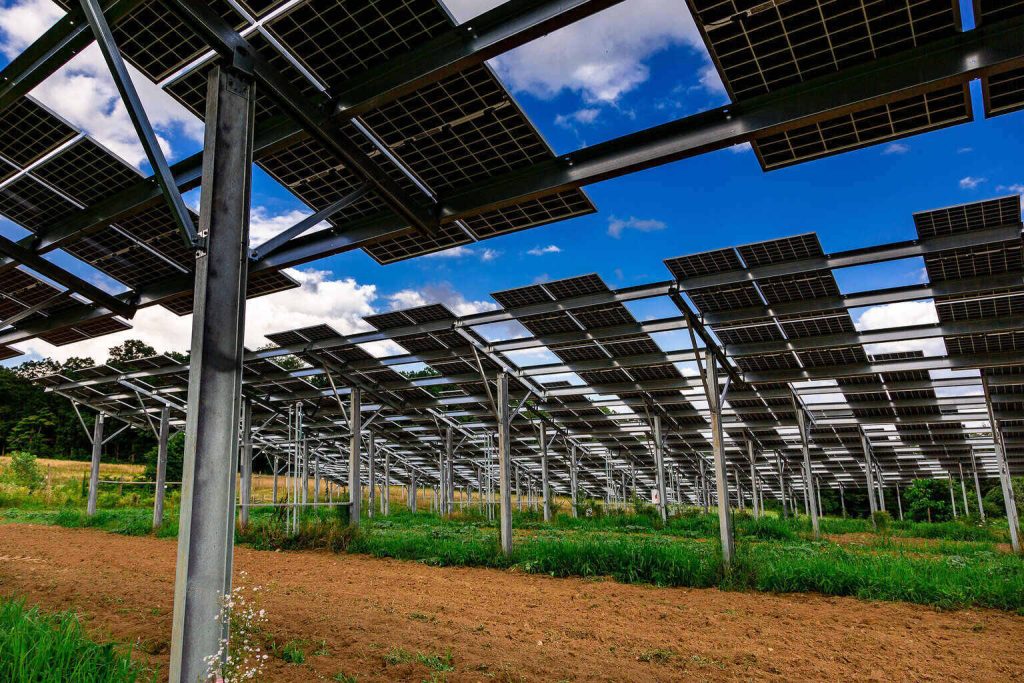
Solar panels are typically tested for around 2400 Pascals of force, equivalent to a wind speed of about 225 km/h. When these structures are installed at certain heights above the ground, they act as a strong barrier against strong winds. By reducing the wind speed at the crop level, they prevent damage and destruction of plants, making them more resistant to severe storms and winds.
Agrisolar Protection Against Heavy Precipitation and Hail
In regions with excessive rainfall, agrisolars offer a significant advantage. Intense and abundant rainfall in a short period of time can lead to soil erosion and root diseases, resulting in crop destruction or permanent loss of agricultural land productivity. Agrisolar systems, however, can help regulate the amount of rainfall that directly reaches the soil. In this way, they assist in maintaining soil integrity and preventing water accumulation. Additionally, agrisolars contribute to reducing the impact of climate change. Soil degradation leads to a decrease in organic matter in the soil, which directly affects the soil’s carbon storage capacity.
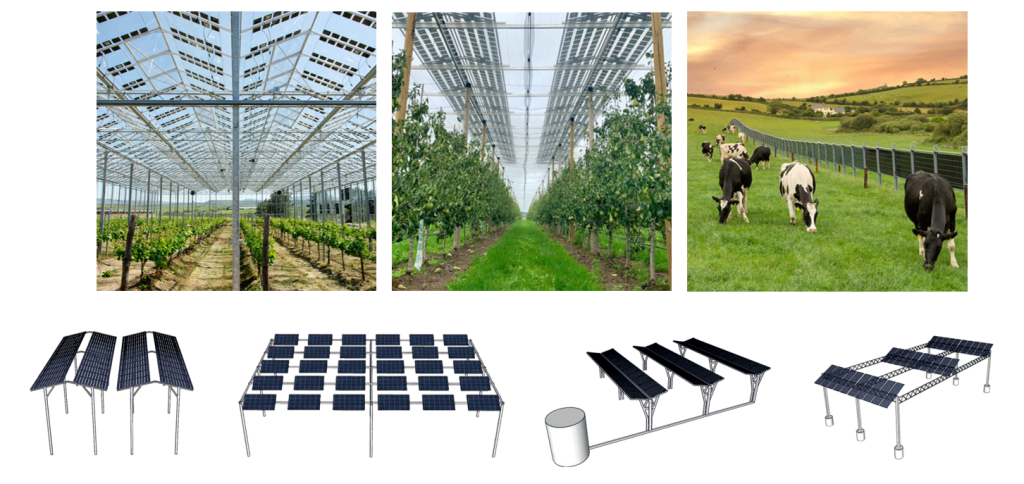
Furthermore, the system can be designed to direct or accumulate excess rainfall, ensuring that water, a precious resource, is not wasted but optimally used during dry periods. This feature also presents an opportunity for the development of smart irrigation solutions, further increasing the resilience of agricultural production.
Hailstorms are another threat that can cause complete catastrophe and loss of agricultural production, directly impacting the livelihood of farmers. In defense against hail, agrisolars can also be used as protection. These structures can serve as shields, absorbing the brunt of the impact. Moreover, solar panel manufacturers take this issue into account independently of agriculture, testing and certifying their panels for hail damage.
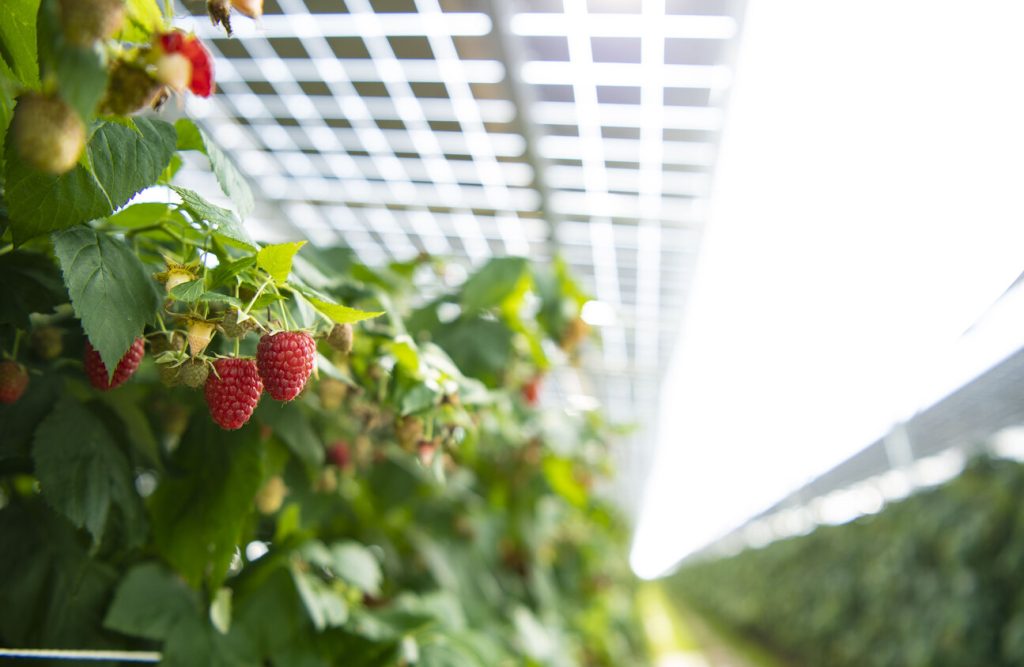
French Research on Weather Protection in Orchards with Agrisolar Systems
The French company Sun’Agri combined its dynamic agrisolar systems with a network of sensors for collecting meteorological and agroclimatic data using artificial intelligence. In collaboration with SEFRA, an experimental orchard in the Auvergne-Rhône-Alpes region of France, they began researching this technology. The goal of the research was to protect crops from extreme weather conditions, optimize production, and establish solid techno-economic references in the field of fruit production. SEFRA took on the crucial task of monitoring agronomic results in terms of crop quality and quantity, tree growth, disease development, and resource consumption. The initial results were very promising, showing that agrisolar structures significantly mitigated frost damage to peaches. Only a 9% loss of flowers was recorded under the agrisolar structures, compared to an incredible 35% in the control, unprotected area.
Further data analysis is ongoing to determine the extent of storm and hail protection provided by agrisolars to the plants in this orchard. However, as we face the threats of climate change and food production insecurity, agrisolars across Europe offer hope for more resilient agriculture. By protecting against extreme weather conditions and smartly managing resources, agrisolars lay the foundation for a more sustainable, stable, and secure future for agriculture.
More on this topic will be available in the Study on the Potential Use of Solar Energy in the Agricultural and Freshwater Aquaculture Sector in Croatia, which will be presented by OIEH on September 6, 2023.


